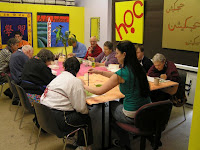Find Facebook pointless? Step off: Facebook and other social media can be great for the health. In fact, anything that gets people interacting regularly can impact health positively. So says a recent study showing that people with strong social relationships have 50% less chance of dying early than people without such support.
According to the study, a meta-analysis examining social relationships and their effects on health, low social interaction was
- equivalent to being an alcoholic
- equivalent to smoking 15 cigarettes/day
- more harmful than not exercising
- two times more harmful than obesity
 And increasing one’s social interactions had a bigger impact on premature death than taking an adult vaccine to prevent pneumonia or taking drugs for high blood pressure.
And increasing one’s social interactions had a bigger impact on premature death than taking an adult vaccine to prevent pneumonia or taking drugs for high blood pressure.
The authors of the study, a team at Brigham Young University in Utah, suggest that government policymakers should look at ways to help people maintain social relationships as a way of keeping the population healthy. They speak specifically in relation to seniors, as that part of the population has the greatest chance of living in isolation.
May I suggest seniors’ play centers? Oh, people could go to these centers to play cards or board games, watch sporting events or exercise. They could hold classes, have speakers and host other fun events. I know that many communities have these clubhouse-type centers already—I know of a few in Florida, myself—but I think this might be a useful expenditure of government money. Why not? If social interactions have such a high impact on health, then why not spend a little money on it? Make the clubhouses nice and have one in every neighborhood.
Everybody dive into Facebook, Twitter and any other social media that allows people to interact 24/7—it’s good for the health!
















